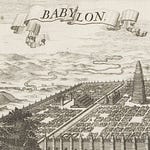Salvē!
This episode of Londinium Chronicles was broadcast live on YouTube and X. Join us this Sunday at 6PM EST for another live broadcast.
The situation in Rome is no change. Domition remains the unpopular Emperor. The situation in Washington D.C. is unchanged. Mr. Trump remains the unpopular emperor.
How many times have we had unpopular emperors? How many presidents have we had? It's the nature of the United States of America inheriting the Roman talent of putting a man (always a man) in place so that we can dislike him and say, Oh, we're so disappointed.
I welcome Germanicus because we're going to attend immediately to what appears to be breaking news, although it will not surprise any of you.
There is some explication necessary as to why this is ironic. “Trump left in dark over airbase attacks on Russia,” reads the London Telegraph. This has to do with a drone attack launched by Kyiv against Russian airfields where bombers capable of carrying nuclear weapons were parked out on the tarmac, and the Ukrainians wanted us to know that they struck them in daylight, one by one, so that you have a looped video of bomber after bomber being hit by a suicide drone.
Significantly, in the middle of the shot are these two words: fail safe. What does that mean?
Fail Safe (1964), with Henry Fonda and a cast of very serious and brave people making statements about the end of the world, involved a theory that was practiced by the Strategic Air Command during the Cold War. You have three legs of the triad to launch a counter weapon force.
The three weapons are 1) the submarine fleet with its ballistic missiles that can be launched anywhere from the ocean; 2) the missile fleet launching from the silos across the western part of the United States; or 3) the bomber fleet.
The bomber fleet was significant because it was the only part of the triad that could be recalled in the event that there was a mistake, so it was always necessary to keep the bomber fleet active and put it up immediately when there was a threat. The bomber fleet would go to its assigned positions and wait to see if there really was a war, whether it got the go code.
The position they held somewhere over the Arctic—this is very romantic—was called the “fail safe” position. That would be the last moment that they would receive a turn back order. If they went past that moment, they were to listen to nothing. They were to hear nothing. And so much so that during the original movie of Fail Safe, we have the wife of one of the captains of the bomber that has damaged incoming radio communication and cannot get the first return to base.
There's been a false alarm and she's screaming at him, but he's trained to ignore everything that the Russians can manufacture, any piece of news to turn us back. And he turns her off. It's very dramatic.
I tell the Fail Safe story quickly and ask Germanicus, how did you regard it when you first saw it?
Watch the full conversation above, or listen to an audio version below:
LINKS:
The John Batchelor Show on Apple Podcasts:
The opinions expressed on this website and on The John Batchelor Show are those of John Batchelor and guests, and not those of CBS News.















Share this post